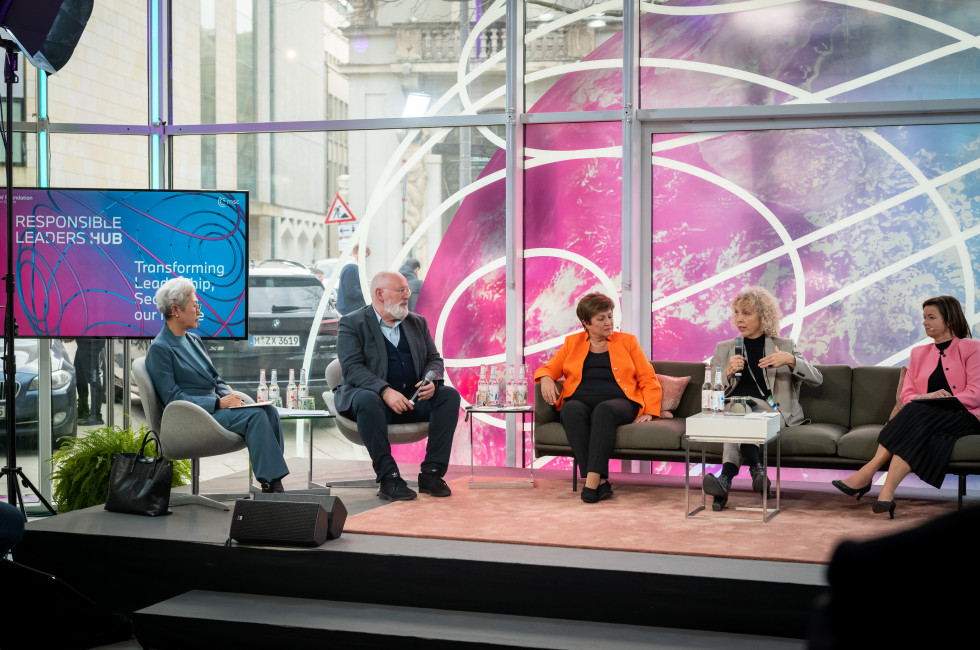Minister Fajon at the 59th Munich Security Conference on women’s rights, climate and EU enlargement

Minister Fajon and panellists speaking at the round-table on climate change | Author Marc Beckmann, BMW Fundacija
At the invitation of the German and Canadian foreign ministers, Minister Fajon took part in the informal meeting of 10 female foreign ministers advocating a feminist foreign policy. They discussed the rights of women and girls facing serious human rights violations in Afghanistan and Iran. “We have to make sure that no-one in the world can segregate one half of the world’s population from society. All women must be safe and free. This is the only way we can progress as a society”, Minister Fajon underlined. She also outlined the process of drafting the National Feminist Foreign Policy Strategy.
One of the key issues discussed at the roundtable on climate change entitled “Smart Cooperation for Bolder Climate Action” was how to build trust and strengthen cooperation among countries in tackling the impacts of climate change. The Minister emphasised that climate change threatens the very existence of humanity and that we can only tackle this key challenge together and through dialogue. “The world is getting ever more complex. We are all working to improve the competitiveness of our economies and our prosperity, and to be prominent players on the international stage. We must work to achieve this in a way that not only reflects our standards and values, but also takes into account the future of our planet and future generations. The planet is not lying when it tells us that we must act now. The climate issue is existential. Our response must therefore be decisive and bold. We all have the right to a clean, healthy and sustainable environment, which Slovenia has long advocated”, the Minister said.
The roundtable, which brought together top climate experts, was organised by the Bled Strategic Forum and BMW Foundation. Minister Fajon was joined at the roundtable by Frans Timmermans, the European commissioner for climate action, Kristalina Georgieva, Managing Director of the International Monetary Fund, Jennifer Morgan, German State Secretary and Special Envoy for International Climate Action, and Fung Yi, Chairwoman of the Foreign Policy Committee of the Chinese People's Congress. “The co-organisation of the roundtable on the margins of the Munich Security Conference reflects the vision of the Bled Strategic Forum to establish an inclusive year-round platform effectively promoting Slovenia’s soft power in foreign affairs and addressing all the topics that are of key importance to both the Slovenian and wider international public”, Minister Fajon stated.
Minister Fajon also took part in the roundtable on the European perspective of the Western Balkans entitled “So Near, Yet so Far: The Western Balkans’ EU Perspective”, which focused on how to enhance the credibility and increase the reliability of the enlargement process. She reaffirmed Slovenia’s strong support for the EU enlargement process, adding that, also in the light of Russia’s aggression against Ukraine, it is necessary to strengthen our political commitment to the Western Balkans region and to bring the enlargement process closer to citizens, especially the younger generations.
“Important international conferences such as the Munich Security Conference, along with their high-quality presentations and panel discussions, always provide an opportunity for numerous bilateral meetings”, explained Minister Fajon. On the sidelines of the conference, she held bilateral meetings with the foreign ministers of the Philippines, Brazil, Andorra, South Korea, Mongolia, Jordan, Togo and with the High Representative of the International Community in Bosnia and Herzegovina. The focus of their talks was on bilateral relations between the countries and cooperation at the multilateral level.
Tomorrow, on 19 February, the Minister will conclude her participation in the conference by taking part in a panel discussion on the future of the European security architecture. She will also meet Dr Comfort Ero, the President of the International Crisis Group, a prominent foreign policy think-tank.

